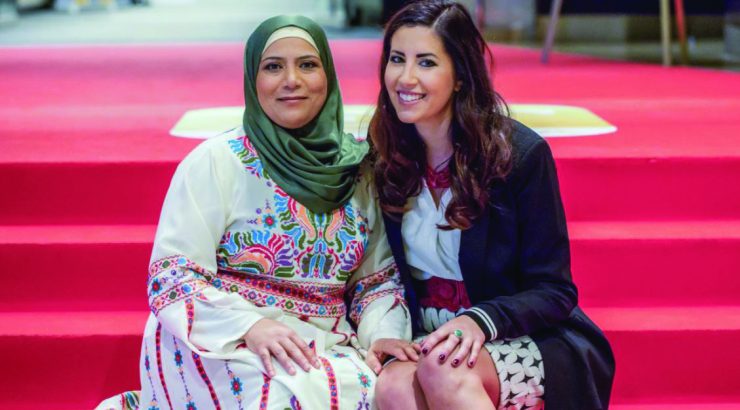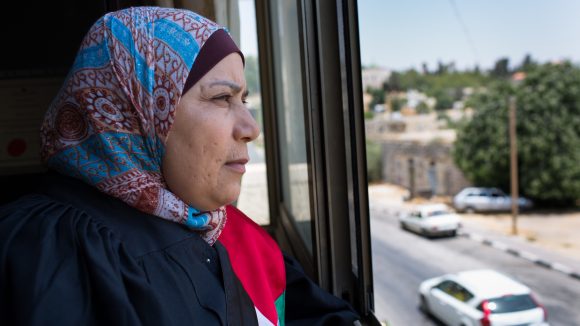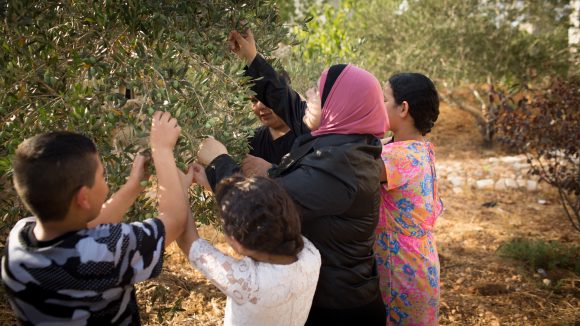
Alumni Spotlight: Erika Cohn ’09 Strength and Hope in new film: THE JUDGE
April 19, 2018
While I was on a shooting hiatus with my last film, In Football We Trust, I lived in Israel/Palestine for 7 months on a Rotary Ambassadorial Scholarship, which I had been awarded after graduating from Chapman University. While there, I taught film, mentored local filmmakers, assisted NGOs launch media advocacy projects, and continued my post-graduate research in Islamic feminism at Hebrew University. One day, a dear friend and colleague invited me to attend a Shari’a law reform meeting in Ramallah.

I was welcomed into a large conference room filled with the images of Arafat throughout the years hanging in old picture frames, and seated at a table surrounded by men in tarbooshes (hats that judges and sheikhs wear). Then Judge Kholoud walked in and everyone stood to greet her. I was immediately struck by her presence – her confidence – her command of the room. I wanted to know more. Who was this woman? What was her story?
I have always been fascinated with how law is interpreted – how power, economics and/or status can influence implementation. I am captivated by the intersect and tension between religion, culture and identity. I am drawn to narratives about strong women. Kholoud’s story stuck with me and I felt that her experiences might invoke a more nuanced understanding of Shari’a, challenge rapidly increasing global Islamophobia and highlight positive advancements for women by women in the Middle East, which are often uncovered or ignored by mainstream media.
Upon learning I was a filmmaker, Kholoud immediately expressed enthusiasm in making a film about her journey. She hoped that sharing her story would inspire other women and girls throughout the Muslim world to pursue leadership roles in their communities, despite cultural and/or traditional norms.
Thus, THE JUDGE was born. I immediately called mentor and Executive Producer, Geralyn Dreyfous to tell her about this encounter, who encouraged me to pursue the project and was an invaluable producing partner throughout the journey.
The first challenge was approaching the Qadi al-Quda (Chief Justice) to gain access to the Shari’a courts. After numerous meetings and proposals (which were later repeated every time a new Qadi al-Quda was appointed) I was granted full access. Along the way, there were some major wake up calls and challenges…one being the search for financing. Throughout the first five years I cannot count the number of times we heard “no,” nor the amount of grant rejections we received, including four from ITVS, who later became a co-production partner. Each time we examined the feedback, made adjustments but ultimately stayed true to the original vision and in the long run, our persistence paid off. We were blessed with access and an incredibly passionate, talented team.
Judge Kholoud’s resilience and determination greatly impacted all of us and will encourage others around the world to persevere through adversity – in asserting legal rights, achieving gender justice and challenging cultural and traditional norms. I believe her story reflects a collective struggle for women’s control over their bodies, economic welfare, custodial rights, and marital status. Finally, I hope THE JUDGE leaves viewers with a greater insight into Shari’a law and strong imagery of powerful Muslim women, while illuminating some of the universal conflicts in the domestic life of Palestine.
It is a tremendous honor to finally share the film with the world after this six-year journey…after a successful film festival release (including, but not limited to TIFF, IDFA, DOCNYC, Full Frame, SF FILM, CPH:DOX), we are opening the film in theatres across the nation beginning on April 13th at Cinema Village in NYC.

